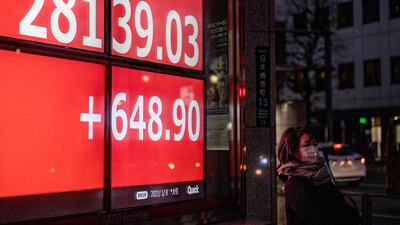Asian shares edged up to near record highs on Friday after US President-elect Joe Biden proposed a $1.9 trillion stimulus plan to jump-start the world's largest economy and accelerate its response to Covid-19.
Mr Biden outlined a proposal that includes $415 billion aimed at the Covid-19 response, some $1tn in direct relief to households, and roughly $440bn for small businesses and communities hard hit by the pandemic.
Global stocks had initially firmed on Thursday on a report that the stimulus package could be as big as $2 trillion, much more than markets were expecting.
Mr Biden's comments came after Federal Reserve chairman Jerome Powell struck a dovish tone in comments at a virtual symposium with Princeton University.
Mr Powell said the US central bank is not raising interest rates anytime soon and rejected suggestions the Fed might start reducing its bond purchases in the near term.
"It is pretty clear that there is going to be significant stimulus. The vaccines are being rolled out, so you are going to [have] significant stimulus in a kind of recovery scenario. That is very bullish for risk assets, particularly as it is unlikely that interest rates will be rising anytime soon," said Michael Frazis, portfolio manager at Frazis Capital Partners in Sydney.
MSCI's broadest index of Asia-Pacific shares outside Japan was up 0.1 per cent, just off a record high. Hong Kong's Hang Seng added 0.32 per cent, while Australia's ASX 200 rose 0.17 per cent.
However, Japan's Nikkei was down 0.21 per cent after touching three-decade highs in the previous session. Chinese blue-chips lost nearly 1 per cent amid worries over rising Covid-19 cases in the country.
More than 28 million people are under lockdown in China. On Friday it reported the highest number of new cases in more than 10 months.
The gains in Asia followed a late dip on Wall Street on Thursday. While US stocks spent most of the trading session in positive territory, helped by the stimulus hopes, concerns over the cost of the package led to a modest decline towards the end of Wall Street trade.
S&P 500 e-mini futures turned lower on Friday after Mr Biden's remarks and were last down 0.2 per cent.
"The concern is what it's going to mean from a tax stand point," said Tim Ghriskey, chief investment strategist at Inverness Counsel in New York.
"Spending is easy to do but the question is how are you going to pay for it ... markets often ignore politics but they don't often ignore taxes."
Investors will be looking to see if banks are starting to take down credit reserves, resume buybacks and provide guidance that shows the economy is improving, said Thomas Hayes, chairman of Great Hill Capital in New York.
In the currency market, the US dollar index, which had rebounded after hitting a nearly three-year low last week, was little changed on Friday at 90.27.

